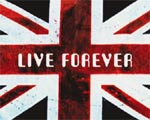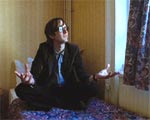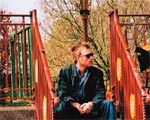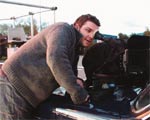LIVE FOREVER - Movie Q&A with John Dower and John Battsek
13 March 2003| LIVE FOREVER Q&A |  | |
| LIVE FOREVER Q&A with John Dower and John Battsek | ||
| Q: I gather that if you hadn't got "the big three" as it were, you wouldn't even have gone ahead with the documentary - for you that was integral to doing it. If so tell us about getting them all to appear in the film. JD: When we'd only got one of them I was very much willing to press on and do the film but that was when I was working back in car boot sales and John Battsek said no we've got to get all three. We got them basically by stalking them really, it took a long time. We made a pact at the beginning that we had to get what we identified as the big three; Pulp, Oasis and Blur. We got Noel first and were still waiting on the other two and because it had taken us a while, I had gone back to working in car boot sales. John (Battsek) was a restraining influence, he said we needed all three so we did. JB: It did feel to me in order to be able to make a film on this scale that we did need the key three. I also new that the process of trying to get all of these people to cooperate and be in the film was going to take a long time, so it was just a question of being as patient as we could bear to be. However, as John Dower says, when you're making a film like this it's hard to be patient because, of course it's how we make a living and the sooner you get making it the sooner you can draw some sort of salary which, means you don't have to do car boot sales. The process of getting people like this for a documentary is a skill I'm not remotely proud of. You have to be able to crawl unbelievably, grovel spectacularly and generally throw yourself at people's feet begging, because guys like these have no real incentive to be in a film like this - when people like Damon, Noel and Liam put themselves in front of a camera they set themselves up most of the time because the majority of people are there to take a pop. So I had to convince their managers that was not what we were about, and then convince them, which takes a hell of a long time. |
|
| Did one lot want to know whether another were in? Why did you not include any Black music in the film? I think that whatever, we're going to get a kicking from various quarters on this film. On one level people are going to say "where are Radiohead or where are the Prodigy?" and that's going to happen. We put our hands up, we did say we wanted to be selective, we wanted a steady focus in the film. If we chucked everyone in, it would certainly have needed a voiceover to explain everything that was going on. Was there any suggestion of doing the Gallagher brothers together and have they seen the film? Q: Did you have any expectations of the bands before you interviewed them and did they live up to them? JB: Having had more experience in having to deal with famous people and superstars etc I actually think I expected them to be much harder to deal with. Once we'd met and heard what we had to say, they all trusted us and I thought they cooperated extremely well. Noel in particular was amazing in his collaboration with us and his willingness. I just wrote an article about this and I continue to be amazed by the fact that he suggested we film him in Glasgow. He and his manager flew themselves up to Glasgow, spent the day there, did the interview and flew themselves back down, without ever asking the production company to pay the bill. That may sound trivial, but actually for a superstar contributing to a film like this to do anything without asking the production company to lay on lavish arrangements for them is, in my experience, kind of amazing. The key players were basically incredibly cooperative considering, as I said, that when they set themselves up in front of cameras and the media, they more often than not get a savaging. How much of an agenda did you have going into the film or was it as far as you were concerned totally freewheeling just to see what developed out of the conversations? Q: Did you approach any other politicians to be in the film and how did you get Peter Mandelson to agree? JB: I have a couple of friends who know Peter Mandelson well and I bugged them, sent him emails via my friends over a long period of time and the answer was constantly no, but I wouldn't give up and I eventually went to meet him and he agreed, saying I don't know what you want me to do or why you want me to do it, but I'll do it. Before he had a chance to change his mind in a matter of days we went over and shot it. Q: Is Live Forever going to be released in America and how do you think it will be received there?
Nobody balked at all, they were quite happy to do as they were told. It wasn't massively important but I didn't want the usual "it's a musician let's plonk them next to a mixing desk in front of a drum set". We tried as much as we could to make them a little evocative and I think Damon's setting, especially with the dartboard, is particularly "Parklife" and Jarvis in that sleazy motel is kind of how he felt after This is Hardcore - he felt a little bit dirty really.
JD: It was quite nice when we finally, finally managed to lure Noel Gallagher into our offices to pitch him the film. Basically he came in and saw the Oscar sitting on the mantelpiece and picked it up and said, "the reason I'm talking to you is because you've got an Oscar, I'm that fucking shallow". |
| ||||||||||||||||||||||||
|
| ||||||||||||||||||||||||
Contactmusic
Top 10 Videos
Wallace Chung
XXX
1
10 Years
Beautiful
2
Fast Girls
Fast Girls
3
Shaggy
Hey Sexy Lady
4
Air
Sexy Boy
5
The Staves
Tired As F***
6
Robin Thicke
Blurred Lines (Unrated Version)
7
All That Remains
Six (Live)
8
Fugees
Boof Baf
9
Fleur East
Sax [Live]
10




